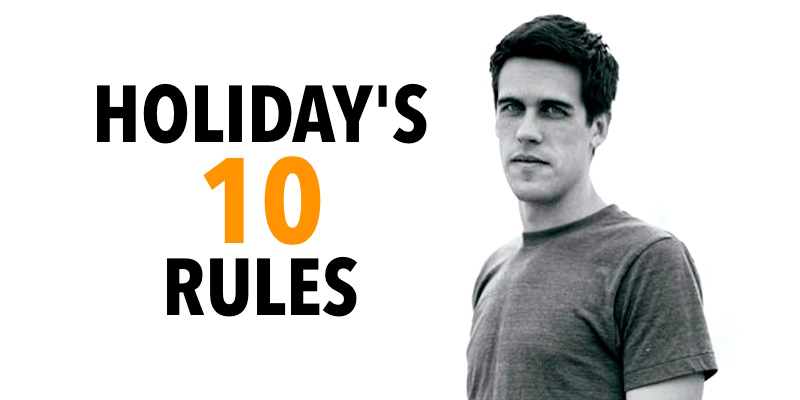Ryan Holiday is an American author, marketer, and entrepreneur. He is a media strategist, the former Director of Marketing for American Apparel and a media columnist and editor-at-large for the New York Observer. He is is the bestselling author of Trust Me I’m Lying: Confessions of a Media Manipulator.
Holiday began his professional career after dropping out of college at the age of 19. He’s also one of the most hated figures in the PR industry. He pulled back the curtain on the dark arts of the industry through revealing the tricks they use to control public opinion. Any marketer or PR person should put this at the top of their reading list.

Here are the 10 success lessons from Ryan Holiday – “Bestselling Author, Media strategist” for entrepreneurs,
1. Page View Kindness Can Make You Popular
Page view kindness is something Holiday touched upon in his book. The idea is that a site will post some breaking news. Thousands of others blogs will respond by writing the same content and linking their blog with the original. They’re going to leech a lot of the page views from the original blog for doing little work.
Many sites will even repost the same or similar content, meaning they can have a competitor link up within minutes of the news breaking. People are drawn in to these websites because they have high page views, and they’re often used in pitches. Brands think they’re dealing with reputable bloggers because of the page views. They don’t dig any deeper than that. This is the sort of ego business leaders have. Big numbers win the day.
2. Channel Your Energy
Holiday says that instead of giving in to frustration, we can put it to good use. It can power our actions, which, unlike our disposition, become stronger and better when loose and bold. We can respond by resisting, or we can channel our energy in a way that empowers and strengthens us.
It’s a power that drives our opponents and competitors nuts. They think we’re toying with them. It’s maddening—like we aren’t even trying, like we’ve tuned out the world. Like we’re immune to external stressors and limitations on the march toward our goals.
3. Books Are The Ultimate New Business Card
Holiday mentions that books are no longer just books. They are branding devices and credibility signals. To lovers of books this will all sound like bad news. But to non-fiction authors, it’s a reality. In some ways, it’s also a bit of a relief and an opportunity. No one is asking you to write the Great American Novel. Nor do you need to sell a million copies. You just need to own and present an interesting idea to the right people.
In this new market, anyone can be a successful author because the definition of success has changed. Readers are no longer the sole “buyers.” In fact, they may be the least important type.
4. You Are More Vulnerable Than You Think
Holiday talks about Jeff Ritze. This is just one of the many fake profiles Holiday used to plant deceptive stories. The stories could be about an individual or a company. The point is this can leave brands with their reputations in tatters. They can be wiped out in a matter of weeks.
For you, this is something to keep in mind. A disgruntled customer or a former employee could very well spread lies about you online. This is why you have to track your online reputation. Make sure you get a PR firm to make sure your strategy is up to scratch.
5. Plan All The Way To The End
There is lesson Ryan Holiday learned from Robert which is best expressed by the French poet Jean de La Fontaine: “In everything, one must consider the end.” Before you jump into anything—say, writing a book—you need to fully envision the end result and have a clear objective before you throw yourself into action.
6. Make A Storm Out Of The Smallest Thing
Holiday touches on this, but this is something you can quite easily see with the 2016 Presidential Elections. Everything you say is analyzed by someone. Say the wrong thing or say it in the wrong way and it can soon turn into a PR firestorm that can quickly engulf you.
This is where people start to have problems. But it’s also something you can learn about to supply fresh new content for your readers. Look at one line or one point made in a popular blog and use that as the premise for a new piece of content. Gear it towards whatever you like and go from there. That’s how growth hackers stop their brands from going stale.
7. Set High Standards And Observe Them
Here Holiday talks about football coach Bill Walsh who took the 49ers from the worst team in the league to Super Bowl champions in just three years. How? He created a culture of excellence and instilled what he called his “Standard of Performance.” That is: How to practice. How to dress. How to hold the ball. Where to be on a play down to the very inch.
Which skills mattered for each position. He knew that by upholding these standards, “the score would take care of itself.”
8. Keep Perspective
Keeping the broadest, grandest, greatest perspective can help us realize what matters and what matters much less. Perspective can come from nature, our smallness, our largeness, and everything in between.
Holiday mentions that we might consider the expanse of time to give us perspective. Some suggest when troubled with a problem to think about whether or not that problem will matter in six months, a year, or two years. If it won’t matter then, perhaps you can spend less time and energy worried about it now.
9. Focus On Process, Not Outcome
Holiday cites a mentor of his, Robert Greene, distinguishing between Alive Time and Dead Time. Alive time is time well spent with purpose and intentionality. Dead time is time wasted and not put to use. In Ego is the Enemy, Holiday uses the example of Malcolm X and his time in prison to illustrate someone who used his time as alive time rather than dead time. In Malcolm X’s case, he used his time in prison to read, study, and learn.
10. The Real News Is All That Matters
The real news in journalism rarely makes the front page because people don’t care. Companies are only interested in what will bring them the largest ad revenues and the most page views. They’re perfectly willing to ignore valid stories just because they don’t meet these criteria. It’s why ethical journalism has fallen.
You already know that marketers that blog gain 67% more leads than those that don’t. And that’s because they’re getting the page views and the ad revenues. They’re doing this through only sticking with the popular issues. It’s not about what’s useful or what’s beneficial. It’s about what sells.




